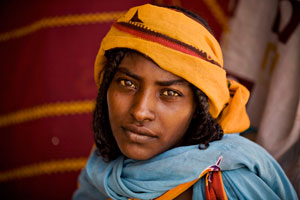
Credits: REUTERS/ Finbarr O’Reilly (CHAD) care of www.alertnet.org
By Caritas staff
Although some calm has returned to eastern Chad after violence earlier in the year, Caritas staff and the people face hard times
In eastern Chad, there are more than 240,000 Sudanese refugees from the conflict in Darfur.
Fears of fresh fighting are at the forefront of people’s concerns. An attack of the Chadian rebels supported before the rainy season or an upsurge of violence in Darfur could generate new arrivals of refugees, internal displacements or have an impact on the humanitarian activities because of an increased insecurity.
In order to cope with any situation, Caritas is preparing to reactivate contingency plans to face possible new displacements.
The security situation is bad. In eastern Chad, humanitarian transportation is dangerous. Though they are protected by police in the camps, humanitarian organisations often have to face car-jacking on the roads.
In May 2008, Pascal Marlinge, Head of Mission of Save the Children was killed by bandits on the road from Farchana to Adré.
A letter was sent to the new Prime Minister by Kinglsey Amaning, United Nations Coordinator in Chad. This letter requests the Prime Minister “to take concrete measures to stop [generalised insecurity] and impunity.”
Since the beginning of 2008, 31 attacks on humanitarian staff have been reported in Eastern Chad. 16 vehicles have been stolen, of which two were Caritas Chad (SECADEV) cars.
SECADEV suspended for two days its non-essential activities in the camps.
“What happened to Pascal Marlinge can happen to any of us. This concerns all of us” said Ahmat Payouni, SECADEV Coordinator in Eastern Chad to the staff during a crisis meeting held on the Friday 2nd of May in the morning.
The Caritas emergency program aims at a greater involvement of the beneficiaries around food security.
The first phase of the program will focus on rainy season agriculture (millet, groundnut, sesame, beans and watermelon).
This activity will contribute to increase refugee food-producing and self-sufficiency as well as to fight against food insecurity among the general population.
Before the traditional culture season arrives, Caritas will distribute seeds and agricultural tools (hoes, axes…) to beneficiaries.
Awai Adma Moussa, a Caritas beneficiary, lives in Borota. She took refuge because of the conflict in a village where she has members of her family living. “They were poor. There was not enough food, nor work nor land to cultivate” she said. She came back to Borota in July to work on her fields and produce millet, the main staple food for the local population.
“We can now eat salad, onion leaves and tomatoes will soon be ripe. The rest will be harvested later” said Awai. The group she works with in the fields would like, with the produce harvested, to create a common cash deposit for the village.
Despite the insecurity and a lack of logistical resources, Caritas wants to reinforce its presence here among people who have received very little aid.
“Caritas has been in that area for 20 years. It has reduced its activities because of a decrease in funding. Now the situation is worse than before” said Idriss Saleh, SECADEV (Caritas Shad) manager in Adre. “Caritas has to be there to help them get back to their day-to-day activities”.
